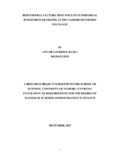| dc.description.abstract | The traditional theory of finance assumes that investors act rationally on the quest of wealth maximisation, and that they follow the basic tenets of risk and return in determining which ventures to spend money on. However, various authors who have examined investors’ behaviour avow that heuristic driven biases and emotions cloud the investors’ judgement, and often negate the rules of rational economic decision making. According to these studies, investors are in fact irrational, and are largely influenced by behavioural factors that introduce biases in their decisions. Behavioural finance is the phenomena where psychology and economics are combined in explaining the irrational decision making processes of economic agents. Psychology explores various facets of human behaviour, and explains how human behaviour deviates from traditional economic assumptions about human behaviour. Proponents of the behavioural finance ideology state that investment decisions are characterised by emotional factors such as endowment, loss aversion, regret aversion and mental accounting, herding behaviour and cognitive factors including overconfidence, gamblers fallacy, hindsight biases and over confidence. This study sought to determine the behavioural factors that influence individual investment decisions at the NSE, which was also the overriding objective of the study. Descriptive research design was used to provide insight on the research problem by describing the behavioural factors that influence individual investment decisions. A case study was used in this examination. The population for this study were the individuals who trade in the NSE. Primary data was obtained through closed and open-ended questionnaires that were self-administered. Some questionnaires were also be emailed to the respondents, depending on the agreed media with the respondent. The investors were also reached through snowballing technique and through the 24 NSE Trading Participants. Multiple regression analysis method of data analysis was adopted. Descriptive statistical measures such as the mean, mode and standard deviation were also calculated using SPSS. The findings of the study reveal that disparities in individual investment decisions are influenced mutually by prospect theory factors, heuristic driven biases and herding behaviour, while the remaining percentage is influenced by factors outside the model employed in this study. The study findings support various studies that have been conducted in the field of behavioural finance. Additionally, the study proposes other analytical models to be used other than regression analysis, such as factor analysis | en_US |



